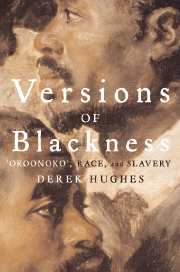Book contents
- Frontmatter
- Contents
- Introduction
- A Note on the Texts
- Chronology
- PART ONE THE MAJOR TEXTS
- PART TWO CONTEXTS: EUROPE, AMERICA, AND AFRICA
- A Short Account of the Destruction of the Indies
- Democrates Secundus
- “Of the Cannibals” and “Of Coaches”
- On Spreading the Gospel Among the Savages
- The English-American his Travail by Sea and Land
- A True and Exact History of the Island of Barbados
- The History of Sir Francis Drake
- Voyage de la France Equinoxiale en l'Isle de Cayenne
- An Exact Relation of the Most Execrable Attempts of John Allin
- The History of the Caribby-Islands
- Histoire Generale des Antilles Habitées par les François
- An Impartial Description of Surinam
- Great Newes from the Barbadoes
- The Negro's and Indians Advocate
- Friendly Advice to the Gentlemen Planters of the East and West Indies
- DISCUSSIONS OF COLONIALISM
- Bibliography
- Index
Voyage de la France Equinoxiale en l'Isle de Cayenne
Published online by Cambridge University Press: 05 June 2012
- Frontmatter
- Contents
- Introduction
- A Note on the Texts
- Chronology
- PART ONE THE MAJOR TEXTS
- PART TWO CONTEXTS: EUROPE, AMERICA, AND AFRICA
- A Short Account of the Destruction of the Indies
- Democrates Secundus
- “Of the Cannibals” and “Of Coaches”
- On Spreading the Gospel Among the Savages
- The English-American his Travail by Sea and Land
- A True and Exact History of the Island of Barbados
- The History of Sir Francis Drake
- Voyage de la France Equinoxiale en l'Isle de Cayenne
- An Exact Relation of the Most Execrable Attempts of John Allin
- The History of the Caribby-Islands
- Histoire Generale des Antilles Habitées par les François
- An Impartial Description of Surinam
- Great Newes from the Barbadoes
- The Negro's and Indians Advocate
- Friendly Advice to the Gentlemen Planters of the East and West Indies
- DISCUSSIONS OF COLONIALISM
- Bibliography
- Index
Summary
Antoine biet (b. c. 1620) was a French Jesuit missionary who, after the fall of the French colony of Cayenne, visited Surinam and Barbados. He writes warmly about the hospitality and trustworthiness of William Byam. Though appalled by the cruel treatment of slaves, he was (as this passage reveals) not opposed to slavery.
Their greatest wealth is their slaves, and there is not one who does not make his master more than a hundred crowns profit per annum. The maintenance of each slave does not cost them more than four crowns in expenditure per annum, and they go completely naked, except for Sundays, when they put on some wretched cotton shorts, and a shirt. The little negroes and negresses go always completely naked, up to the age of fourteen or fifteen. As for their food, there is no nation which feeds them so badly as the English, since for every dish and every form of meat they have only potato, which serves them for bread, meat, fish, and for everything. They keep some poultry for the eggs, which they give to their little children. They are given meat only one time in the entire year, namely on Christmas day, which is the only feast day observed in this island. The English and French indentured servants are scarcely better treated. They are indentured for seven years, and also have nothing but potato. The English are obliged to maintain them, but God knows how they are maintained.
- Type
- Chapter
- Information
- Versions of BlacknessKey Texts on Slavery from the Seventeenth Century, pp. 313 - 314Publisher: Cambridge University PressPrint publication year: 2007



